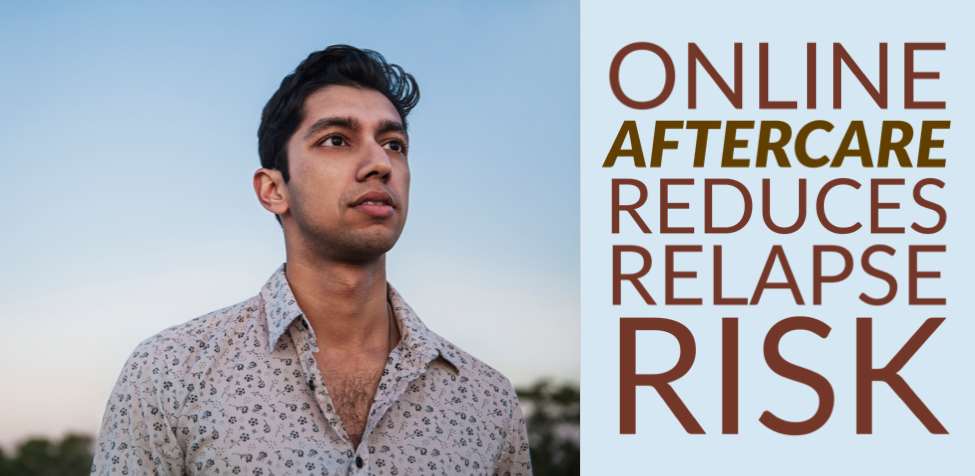Reducing the Risk of Relapse with Aftercare

Addiction is well-known for its tendency to relapse. In fact, sobriety is nothing more than preventing a relapse!
In some ways, the most challenging part of establishing and maintaining long-term recovery occurs after the initial, intensive phase of treatment.
Most recovering people need to be in the warm embrace of loved ones to avoid relapse, whether it’s their close biological family or a new “family” of other recovered people to whom they can turn when they feel threatened by relapse.
According to one study, the following five factors most frequently contribute to relapse:
- Inability to deal with stress or negative emotions
- Interpersonal conflicts with family or others
- Failure to follow doctor and counsellor recommendations
- Negative thinking
- Low desire to change
- Lack of family support
- A co-occurring mental health disorder
People with an addiction, for example, must learn how to avoid triggers that may set off their brain’s demanding cry for drugs or alcohol. When those triggers are unavoidable, people must learn how to prevent the craving from taking over. These skills must be taught as part of any treatment programme and maintained as part of an aftercare programme or long-term recovery plan.
Relapse prevention is emphasised heavily at Hope Trust. All clients are optimally prepared to stay sober, from relapse education to learning the tools to avoid relapse to developing individual relapse prevention strategies.
“Aftercare is just that,” says Rahul, Hope Trust’s addiction therapist. “You need to be involved in continuing care if you’re going to survive this.” If you don’t follow your therapist’s advice and avoid support group meetings, such as Alcoholics Anonymous (AA) leave after initial treatment, you’ll be back in no time. You cannot resist the temptation.”
“I cannot overstate the importance of the aftercare contract and programme,” says Rajeshwari, a psychologist at Hope Trust. “It’s the key to success.”
Aftercare is a crucial component of addiction treatment that follows the initial phase of rehabilitation. Its importance cannot be overstated, as it plays a significant role in helping individuals maintain their recovery and avoid relapse.
Here are some key reasons why aftercare is important after initial addiction treatment:
Transition to the Real World: The structured environment of a treatment facility is a controlled and supportive setting where individuals can focus on their recovery. Aftercare helps bridge the gap between this controlled environment and the challenges of the real world. It eases the transition by providing ongoing support and guidance.
Relapse Prevention: Addiction is a chronic disease, and relapse is a common part of the recovery process. Aftercare programs often include relapse prevention strategies, coping skills, and techniques to recognise and manage triggers and cravings. These tools are crucial in helping individuals prevent relapse and maintain their sobriety.
Accountability and Support: Aftercare programs typically involve regular meetings, therapy sessions, or support group participation. These ongoing connections give individuals a sense of accountability and a support network that can be crucial during times of temptation or stress.
Monitoring Progress: Aftercare programs allow professionals to monitor an individual’s progress in recovery and adjust their treatment plan as needed. This ongoing assessment ensures that the person’s needs are met and that any emerging issues or challenges are addressed promptly.
Continued Education: Addiction is a complex condition, and recovery is an ongoing process of learning and growth. Aftercare programs often offer educational components to help individuals understand addiction better, improve their life skills, and make healthier choices.
Emotional and Psychological Support: Many people struggling with addiction also have co-occurring mental health issues. Aftercare programs provide ongoing access to therapists and mental health professionals who can address these issues and provide emotional support.
Building a Sober Lifestyle: Recovery is not just about abstaining from substances but also about building a fulfilling and sober life. Aftercare programs can help individuals establish new routines, hobbies, and social connections that support their recovery goals.
Long-Term Success: The goal of addiction treatment is not just short-term sobriety but long-term recovery and well-being. Aftercare programs are designed to support individuals in achieving and maintaining lasting sobriety and overall improved quality of life.
Peer Support: Many aftercare programs include peer support groups or 12-step meetings, where individuals can connect with others who have faced similar challenges. Peer support can be a powerful motivator and source of encouragement.
Family and Relationship Rebuilding: Addiction often strains relationships with family and friends. Aftercare programs may offer family therapy or counselling to help rebuild and strengthen these relationships, which are crucial for long-term recovery.
Aftercare is an Essential Part of Addiction Treatment
Aftercare is essential because it provides ongoing support, education, and resources to individuals in recovery, helping them maintain sobriety and improve their overall quality of life. It is a critical component of the continuum of care in addiction treatment and significantly increases the chances of successful, long-term recovery.
Hope Trust’s aftercare programme is available online or in-clinic and has proven effective for over twenty years.
Are you new to addiction recovery? Enrol in our aftercare program and ensure continued sobriety and progress.
Email: info@hopetrustindia.com